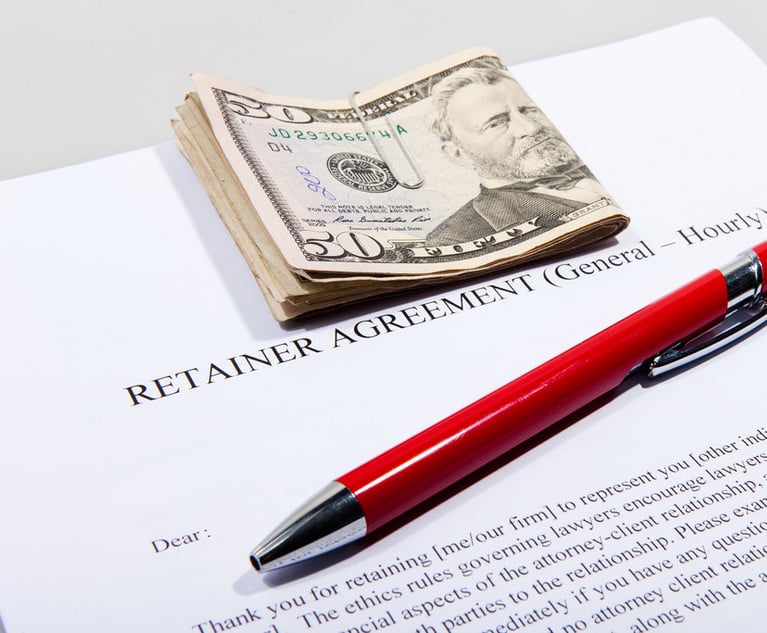Chick-fil-A Ouster From San Antonio Airport a Constitutional Issue, Texas AG Charges
“The Constitution's protection of religious liberty is somehow even better than Chick-fil-A's chicken,” Texas Attorney General Ken Paxton said Thursday. “Unfortunately, I have serious concerns that both are under assault at the San Antonio airport.”
March 28, 2019 at 10:32 PM
5 minute read
 (Photo: rblfmr/Shutterstock.com)
(Photo: rblfmr/Shutterstock.com)
Texas Attorney General Ken Paxton flogged the City of San Antonio Thursday for taking Atlanta-based Chick-fil-A off the menu at airport restaurants.
“The Constitution's protection of religious liberty is somehow even better than Chick-fil-A's chicken,” Paxton said in a letter to Mayor Ron Nirenberg and the San Antonio City Council. “Unfortunately, I have serious concerns that both are under assault at the San Antonio airport.”
“The City's Attorney's Office is reviewing the letter,” the mayor said through a spokesman. “I am withholding comment until we have had adequate time to analyze it.”
 Ken Paxton
Ken PaxtonThe attorney general's feathers were ruffled over a vote a week ago by the San Antonio City Council to remove Chick-fil-A from a new airport concessionaire contract. Paxton provided the details in a separate letter to U.S. Secretary of Transportation Elaine Chao, which he also shared with the mayor and council—and the media. The attorney general told the secretary that San Antonio may be in violation of federal law and risk losing airport funding. Paxton said he has opened an investigation into the situation and urged Chao to do the same.
“Last week, the San Antonio City Council voted to discriminate against a popular American fast food restaurant—Chick-fil-A—because of that organization's religious beliefs,” Paxton told Chao. “The Council was in the process of approving a concessionaire agreement with Paradies Legadere (Paradies) to run concession facilities in the San Antonio airport. The Paradies proposal included a license that would bring Chick-fil-A to the airport.”
Paxton said the plan had received a 95.8 rating on a 100-point scale, with the next best competitor coming in at 73.40.
“When the Council moved to adopt the staff recommendation to agree to the Paradies contract, a Council member instead moved to exclude and replace Chick-fil-A,” Paxton said. He added the councilman said Chick-fil-A has a “legacy of anti-LGBT behavior.” The Council member who seconded the motion referred to Chick-fil-A as a “symbol of hate,” Paxton said.
“This was despite testimony from City staff that, in its contract, Paradies would include compliance with San Antonio's ordinance that prohibits discrimination based on sexual orientation or gender identity,” Paxton said.
Chick-fil-A founder and self-made billionaire S. Truett Cathy was devoutly religious and always closed his restaurants on Sunday for the stated purpose of allowing workers to attend church. But it was his son and successor as CEO, Dan Cathy, who started the controversy in the summer of 2012 by telling the Baptist Press about his support of what he called traditional marriage.
“We know that it might not be popular with everyone, but thank the Lord, we live in a country where we can share our values and operate on biblical principles,” he was quoted saying.
After that, Chick-fil-A became the target of boycotts, protests and picketing. Further tarnishing the corporate image, anti-gay groups jumped in to support the company. Two years later, the younger Cathy told the Atlanta Journal-Constitution he regretted “making the company a symbol in the marriage debate.” He said every leader makes mistakes and learns from them, adding, “If not, you're just a fool.” He didn't exactly solve the problem. Forbes carried a headline that quoted Dan Cathy saying, “Gay Marriage Still Wrong, But I'll Shut Up About It And Sell Chicken.”
Chick-fil-A did not have an immediate response to Paxton's stand.
“The City's decision to specifically exclude Chick-fil-A from a government program based on the sincerely-held religious beliefs of its leadership raises serious constitutional questions,” the AG told the transportation secretary. “As you are no doubt aware, the Supreme Court has affirmed that the Free Exercise Clause protects individuals and organizations of faith alike. See Burwell v. Hobby Lobby Stores, Inc., 573 U.S. 682 (2014).”
Paxton went on to cite Masterpiece Cakeshop, Ltd. v. Colorado (2018), in which SCOTUS “soundly rebuked state actors for actions based on animosity to religious belief similar to those in question here.”
The AG went on to suggest that San Antonio may be in violation of multiple state and federal statutes.
“In addition to potential violations of the First Amendment, it seems likely the City of San Antonio's apparent discrimination against Chick-fil-A violates various federal statutes and regulations to which the City is subject as a recipient of Department of Transportation grant funds,” Paxton told Chao. “There is no evidence indicating that Chick-fil-A has ever maintained any policy or practice of discriminating against any group of people, and the City offered no such evidence as the basis of its action. Indeed, shortly after the City's decision was announced, a member of the City Council who dissented from the City's decision openly apologized to the Chairman of Chick-fil-A, noting that the restaurant 'employs and serves everyone, without prejudice, discrimination or hate.'”
This content has been archived. It is available through our partners, LexisNexis® and Bloomberg Law.
To view this content, please continue to their sites.
Not a Lexis Subscriber?
Subscribe Now
Not a Bloomberg Law Subscriber?
Subscribe Now
NOT FOR REPRINT
© 2025 ALM Global, LLC, All Rights Reserved. Request academic re-use from www.copyright.com. All other uses, submit a request to [email protected]. For more information visit Asset & Logo Licensing.
You Might Like
View All
40% Contingency: A New Ruling Just Cost This Plaintiff Team $827K in Legal Fees
6 minute read
'David and Goliath' Dispute Between Software Developers Ends in $24M Settlement

Trending Stories
- 1Special Series Part 5: The State’s Bond Lock Impermissibly Delegates Legislative Authority
- 2President-Elect Donald Trump Sentenced to Unconditional Discharge
- 3JCPenney Customer's Slip-and-Fall From Bodily Substance Suit Best Left for a Jury to Decide, Judge Rules
- 4Products Liability: The Absence of Other Similar Claims—a Defense or a Misleading Effort to Sway a Jury?
- 5529 Accounts Are Not Your Divorce Piggybank
Who Got The Work
Michael G. Bongiorno, Andrew Scott Dulberg and Elizabeth E. Driscoll from Wilmer Cutler Pickering Hale and Dorr have stepped in to represent Symbotic Inc., an A.I.-enabled technology platform that focuses on increasing supply chain efficiency, and other defendants in a pending shareholder derivative lawsuit. The case, filed Oct. 2 in Massachusetts District Court by the Brown Law Firm on behalf of Stephen Austen, accuses certain officers and directors of misleading investors in regard to Symbotic's potential for margin growth by failing to disclose that the company was not equipped to timely deploy its systems or manage expenses through project delays. The case, assigned to U.S. District Judge Nathaniel M. Gorton, is 1:24-cv-12522, Austen v. Cohen et al.
Who Got The Work
Edmund Polubinski and Marie Killmond of Davis Polk & Wardwell have entered appearances for data platform software development company MongoDB and other defendants in a pending shareholder derivative lawsuit. The action, filed Oct. 7 in New York Southern District Court by the Brown Law Firm, accuses the company's directors and/or officers of falsely expressing confidence in the company’s restructuring of its sales incentive plan and downplaying the severity of decreases in its upfront commitments. The case is 1:24-cv-07594, Roy v. Ittycheria et al.
Who Got The Work
Amy O. Bruchs and Kurt F. Ellison of Michael Best & Friedrich have entered appearances for Epic Systems Corp. in a pending employment discrimination lawsuit. The suit was filed Sept. 7 in Wisconsin Western District Court by Levine Eisberner LLC and Siri & Glimstad on behalf of a project manager who claims that he was wrongfully terminated after applying for a religious exemption to the defendant's COVID-19 vaccine mandate. The case, assigned to U.S. Magistrate Judge Anita Marie Boor, is 3:24-cv-00630, Secker, Nathan v. Epic Systems Corporation.
Who Got The Work
David X. Sullivan, Thomas J. Finn and Gregory A. Hall from McCarter & English have entered appearances for Sunrun Installation Services in a pending civil rights lawsuit. The complaint was filed Sept. 4 in Connecticut District Court by attorney Robert M. Berke on behalf of former employee George Edward Steins, who was arrested and charged with employing an unregistered home improvement salesperson. The complaint alleges that had Sunrun informed the Connecticut Department of Consumer Protection that the plaintiff's employment had ended in 2017 and that he no longer held Sunrun's home improvement contractor license, he would not have been hit with charges, which were dismissed in May 2024. The case, assigned to U.S. District Judge Jeffrey A. Meyer, is 3:24-cv-01423, Steins v. Sunrun, Inc. et al.
Who Got The Work
Greenberg Traurig shareholder Joshua L. Raskin has entered an appearance for boohoo.com UK Ltd. in a pending patent infringement lawsuit. The suit, filed Sept. 3 in Texas Eastern District Court by Rozier Hardt McDonough on behalf of Alto Dynamics, asserts five patents related to an online shopping platform. The case, assigned to U.S. District Judge Rodney Gilstrap, is 2:24-cv-00719, Alto Dynamics, LLC v. boohoo.com UK Limited.
Featured Firms
Law Offices of Gary Martin Hays & Associates, P.C.
(470) 294-1674
Law Offices of Mark E. Salomone
(857) 444-6468
Smith & Hassler
(713) 739-1250







